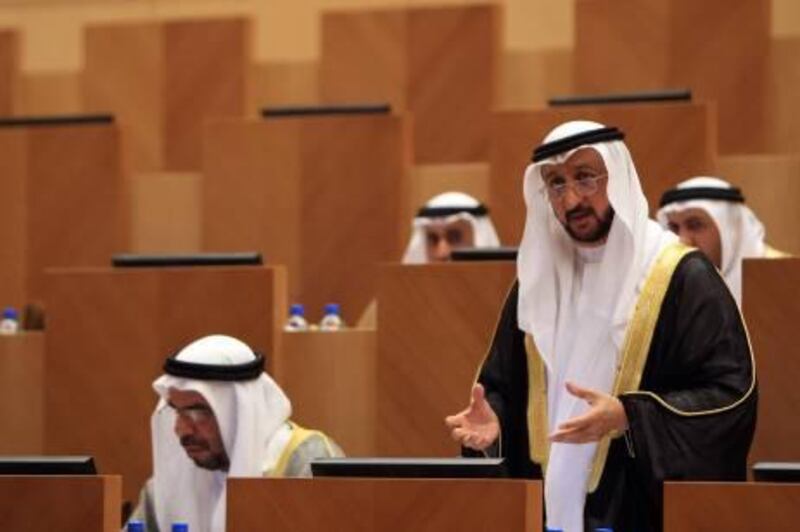ABU DHABI // Some major ministries say they will need hundreds of millions of dirhams more than their allocated budget for next year, records show.
Documents obtained from the Federal National Council this week, which record details of meetings between representatives of the federal bodies and the FNC finance committee, offer a glimpse into the financial demands of federal ministries and institutions, some of which say their 2011 budgets are not sufficient.
They also show how the governments of Abu Dhabi and Dubai frequently pitch in to shore up the finances of the federal bodies.
The large shortfalls highlight the challenges facing these ministries as they adapt to a new budget system that forces them to justify every expense.
Nevertheless, proponents of this "zero-based" budget say it will make the federal Government more transparent and less wasteful.
The FNC documents also dealt with contributions to the federal budget. Representatives from the Ministry of Finance said that Dubai had paid Dh500 million towards the federal budget as of November; Dubai is supposed to pay Dh100m a month for a total of Dh1.2 billion. The emirate has had to contend with the effects of the bursting of its real estate bubble, which threatened the liquidity of state-owned conglomerates such as Dubai World.
Abu Dhabi's contribution was also less than projected at the end of last year. Although the emirate was supposed to contribute Dh16.6bn for the 2010 budget year, it paid Dh14.3bn. The amount is projected to decline to Dh11.6bn in 2011.
"Revenues are in decline, so it is natural that spending will decline," Sultan al Suwaidi, a member from Dubai, said during the budget debate on Tuesday. "But the complaints are bitter, from all institutions, whether health, education or higher education and others."
"They complain of the lack of financial resources, then the Government came and reduced the budget five per cent," he added.
Representatives of the Higher Colleges of Technology (HCT) said their budget was "not enough for development or accomplishing the strategic goals with the existing numbers [of students]".
Records show the HCT, one of three federal universities, estimated their budget needs for next year at Dh1.3bn, over half a billion dirhams more than the Dh735m allocated to its colleges.
The new budget covers three years, so the HCT budget, frozen since 2009, will probably remain the same until the end of 2013.
The HCT estimated that it would need almost Dh1.76bn in 2013, which means its budget will fall short of its needs by more than Dh1bn, according to a letter sent to the Minister of Higher Education.
The colleges currently have 19,370 students, a number expected to grow to 22,000 by 2013.
Records show the colleges were given additional financial assistance by the Government of Dh234m this year, although it fell short of their request for Dh400m. The HCT said it was forced into overdraft borrowing to cover the salaries of its employees.
The university said the issue of fees paid by students should be looked at because of the "record" number of student applications. The Constitution guarantees free education for nationals.
The budget allocated to UAE University is only for teaching and none of it was earmarked by the Government for expanding infrastructure or research, the university's representatives said.
The university, which has 12,000 students, said it received generous donations from Abu Dhabi and was trying to attract outside assistance and reduce its costs so that it could develop a scientific research programme.
It also said it had lost staff to local authorities in Abu Dhabi that offered more competitive wages.
Meanwhile, the Ministry of Health's budget is not enough to finance its programmes to fight chronic diseases like diabetes, amid rising costs of medicine, medical equipment and the need to develop or maintain ailing facilities.
Most programmes for fighting chronic diseases had not had money allocated, the ministry's representatives told the FNC.
The ministry said an outside consultant recommended a Dh500m increase in its budget. Projected spending by the ministry in 2011 is Dh2.66bn. In the 2010 budget resolution, that figure was Dh2.79bn.
"In 2011, the ministry will face a crisis," the representatives said, adding that most of the ministry's debt would be due to the cost of buying medicine.
The Ministry of Interior said the Dh200m increase in its budget was not enough - it needed Dh1bn. More than 90 per cent of the ministry's budget went to paying salaries, and the FNC said in its report that this was hurting security services.
The Zayed Housing Programme said it had received 50,000 applications for a programme to set up new housing units, but the project's budget only allows it to set up 3,000 of these.
The FNC barely passed the budget resolution on Tuesday, with just 21 members out of 40 present for the final vote. The budget projects Dh41bn of spending against Dh38bn in revenues, or a Dh3bn deficit.







